Healthcare System in Palestine
Posted in: Programs
The healthcare system in Palestine, though it is a caring, educated and productive one, struggles to provide adequate services for the population. In part, this is because of the interconnectedness of the healthcare system with other social systems like education, food production and utilities, as well as the high levels of unemployment, poverty, conflict and displacement in the region.
The World Bank reports a poverty level of 26 percent in the region, along with an unemployment rate of 15 percent in the West Bank and 47 percent in Gaza. The difficult conditions in which many Palestinians live exacerbate the shortcomings of the healthcare system and make it more challenging for Palestinians to access quality healthcare when they need it.
Fortunately, humanitarian and development programs like ours can help alleviate some of the challenges of healthcare in Gaza and the West Bank.
Healthcare in Palestine
Healthcare professionals in Palestine work tirelessly to care for the large population. But several factors impede the effectiveness of their work and prevent Palestinians from accessing quality medical care.
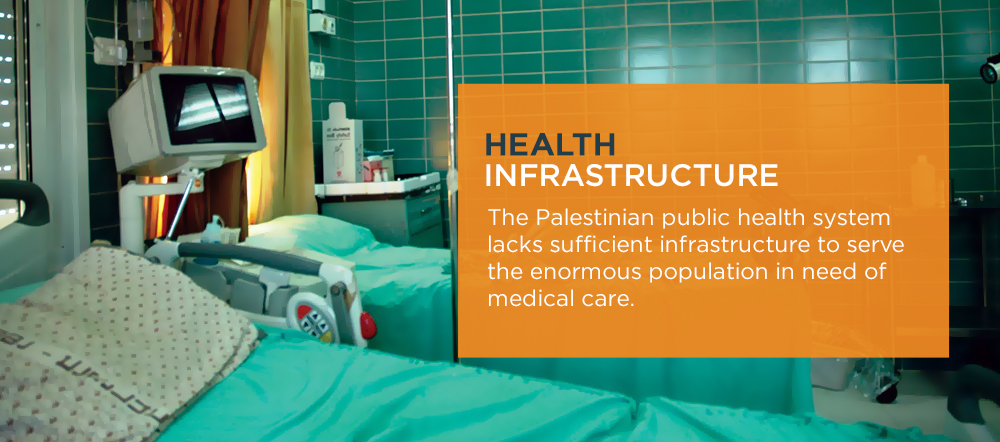

Health Infrastructure
The Palestinian public health system lacks sufficient infrastructure to serve the enormous population in need of medical care. Years of restrictions on imports — the Israeli and Egyptian blockade of Gaza in particular — have left the Palestinian hospital system with critical shortages of supplies like medical equipment, prescription drugs, over-the-counter medications and protective gear. Ongoing conflict has also left many hospitals and clinics in disrepair, and restrictions on goods make it difficult to procure supplies for rebuilding.
Electricity and water shortages also impede the healthcare industry in its work. Electricity in both Gaza and the West Bank can be intermittent and unpredictable. The lack of reliable electricity makes it even more difficult to care for patients — even where medical equipment exists, doctors cannot always operate it. The lack of running water also leads to challenges in maintaining sanitary medical facilities.
The personnel infrastructure is limited as well. Palestine suffers from a shortage of family medicine doctors, especially those who practice in children’s health. Specialty fields such as neurology, oncology, pediatric surgery and psychiatry suffer heavy personnel shortages. In part, shortages arise because doctors who want to specialize in these fields must leave Palestine for training and do not always return once their education is complete. Medical care in both the West Bank and Gaza suffers from physician shortages.
Palestinian Refugee Camps
Healthcare in the West Bank and Gaza faces significant challenges in extending quality medical care into the refugee camps. Palestinians represent the world’s largest displaced population. Thousands of refugees live in camps in Gaza and the West Bank — about 500,000 in the West Bank and 200,000 in Gaza, all crowded into small spaces with minimal services. Ninety percent of refugee families in the West Bank, along with 100 percent of refugees in Gaza, report that their children are not in good health. Poverty, poor sanitation, lack of electricity and running water, food insecurity and minimal medical facilities all contribute to health issues in the camps.
Permits and Restricted Travel
The Palestinian healthcare system faces barriers in the form of permit restrictions that limit Palestinian access to healthcare. Restrictions on access and movement are common in Palestine, and they make access to healthcare incredibly difficult. Many specialized hospitals are located in East Jerusalem, but Palestinians are often denied permits to travel there, even to receive desperately needed medical care.
Gaza healthcare is severely affected since Gaza is subject to particularly heavy restrictions. These restrictions on travel have a crippling effect on patient care. Nearly one out of every five Gaza patients who apply for a visa to get medical care in East Jerusalem, Jordan, Israel or even the West Bank receives a denial or experiences a significant delay. But restrictions on travel limit the accessibility of West Bank healthcare as well, especially in Area C.
Child Healthcare in Palestine
Children’s healthcare makes up a large portion of Palestine’s healthcare services because the population as a whole is so young. Forty percent of Palestinians are younger than 18.
The main healthcare provider for children in Palestine is the Palestinian Ministry of Health, which provides primary care services for children up to five years of age. It also operates about one-third of the hospitals in the West Bank and Gaza and provides secondary care for children in those hospitals.
In addition to the Palestinian Ministry of Health, families have a few other options for children’s health services:
- The United Nations Relief and Works Agency for Palestine Refugees in the Near East (UNRWA), which provides primary healthcare services.
- Nongovernmental organizations (NGOs), which offer some primary healthcare services, some secondary care services and, in Jerusalem, many of the tertiary — the most specialized — care services.
- The Palestinian Red Crescent, an organization that operates clinics and provides ambulance services.
- The private sector, a relatively new sector in Palestinian healthcare.
Access to Children’s Healthcare in Palestine
Access to children’s healthcare in Palestine is often limited.
For children who require specialist care, access is significantly limited — as with adult medicine, most specialist doctors practice in Jerusalem. To travel to Jerusalem, children and their families need permits. For Gaza residents in particular, these permits are notoriously difficult to obtain. Even ambulance transfers to Jerusalem are often challenging to arrange.
Shortages of medical equipment and a dearth of trained staff also compound the difficulty of accessing quality healthcare for children. In particular, Palestine suffers from a severe shortage of services for children with disabilities, child protection and children’s mental health.
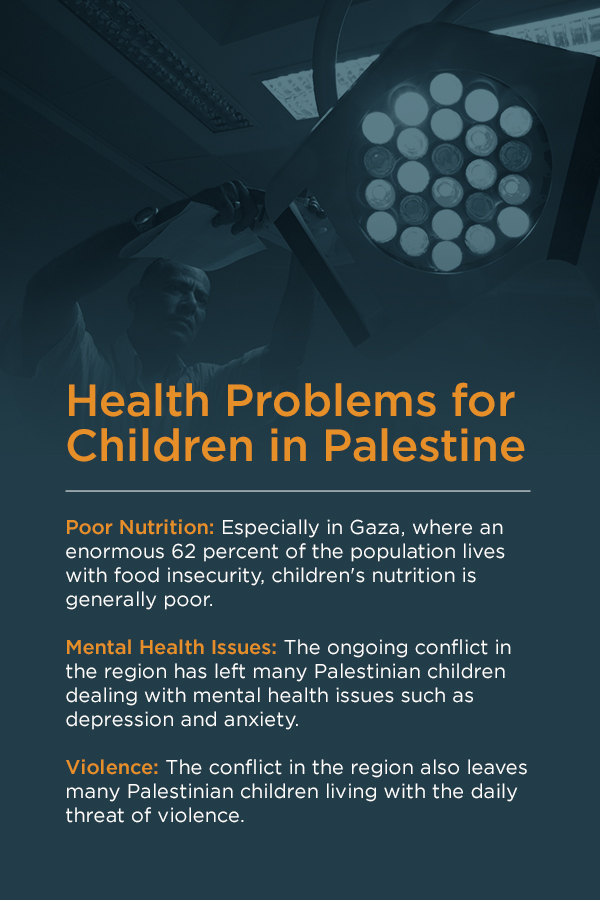

Health Problems for Children in Palestine
The population of Palestine as a whole experiences poverty, migration, ongoing conflict and poor environmental quality. These issues and the social effects they give rise to have a detrimental effect on children’s health in particular. Many children in Palestine suffer from poor nutrition, mental health issues and abuse or other violence.
The generally accepted worldwide standard of child health is the under-five mortality rate (UFM), which measures the proportion of children who die before their fifth birthdays. Countries such as Finland and Iceland, who lead the world with their low UFM rates, see deaths of only two children per 1,000 live births. The average UFM in high-income countries generally is five deaths per every 1,000 live births. Israel has a UFM of four, and Lebanon has a UFM of seven. In Palestine, the UFM is currently holding at 20.3 out of every 1,000 live births.
Children who survive still face severe health problems, including the following:
1. Poor Nutrition
Especially in Gaza, where an enormous 62 percent of the population lives with food insecurity, children’s nutrition is generally poor. A 14+ year blockade of land and sea borders severely limits the goods that can come into the territory, and many families who live in poverty do not have the money to buy fresh fruits and vegetables.
Malnutrition leads directly to stunted growth. In the West Bank, the level of stunting in children is almost 8 percent. In Gaza, where malnutrition is more prominent, the level of stunting rises to 13 percent. Iron deficiency is also common, especially among Gaza’s children.
2. Mental Health Issues
The ongoing conflict in the region has left many Palestinian children dealing with mental health issues such as depression and anxiety. In 2003, a study found that a staggering 93 percent of Palestinian children experience fear, a loss of security and feelings of being threatened. One out of every five children has had to move either permanently or temporarily because of the ongoing conflict. Children in Gaza experience these upheavals more often than children in the West Bank, and children in Palestinian refugee camps experience them more often than children in rural areas.
Among Palestinian teenagers, mental health issues are common as well in response to traumatic events. Studies report that 80 percent of Palestinian teenagers have witnessed shootings, 28 percent have seen a stranger being killed and 11 percent have witnessed the killing of a friend or neighbor. Witnessing these traumatic events can lead to chronic mental health issues.
3. Violence
The conflict in the region also leaves many Palestinian children living with the daily threat of violence. Forty-eight percent of Palestinian children have experienced firsthand violence or directly witnessed a close family member becoming a victim of violence.
Violence is common both in homes and at school as nerves strain under the stress of daily life. Ninety-three percent of Palestinian mothers report that their children have experienced violence in the home. And 45 percent of mothers report that their children have experienced violence at school. Verbal and physical abuse from teachers — as well as from other students — is not uncommon.
The security instability in the region contributes to high levels of violence against children as well. Children on their way to school are sometimes attacked and beaten. More than 1,800 children have been killed since 2000 as a direct result of the occupation.
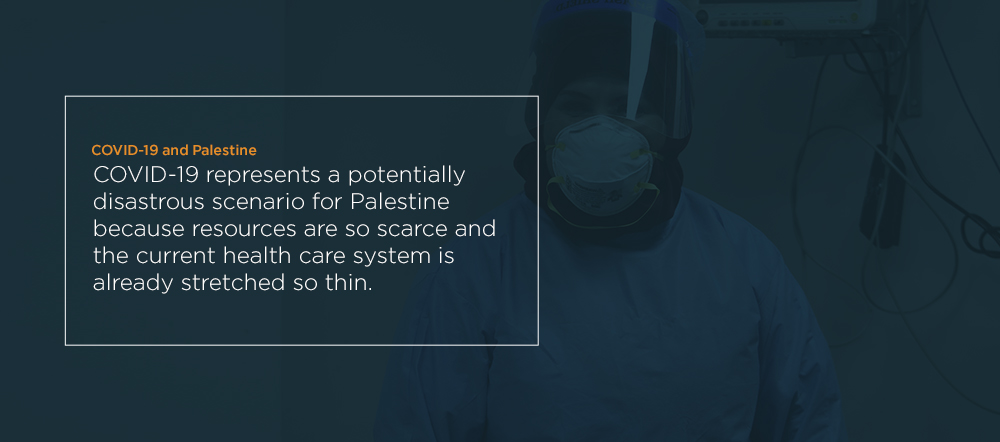

COVID-19 and Palestine
COVID-19 represents a potentially disastrous scenario for Palestine because resources are so scarce and the current healthcare system is already stretched so thin.
The number of hospital beds, intensive care unit (ICU) beds, medical staff and ventilators will all run critically short when the pandemic hits in earnest. As of March 2020, Gaza had only 120 ICU beds and critically ill patients occupy many of them. In late May, WHO reported that Palestine as a whole has only 343 adult ventilators, for a population of 4.9 million – 87 in Gaza and 256 in the West Bank. The shortage of test kits and drugs will also pose difficulties as medical professionals struggle to address the pandemic, especially in the refugee camps. With COVID cases rising, Palestinians are in a precarious position as they struggle to remain healthy.
The constant, unpredictable electrical outages will only further impede lifesaving medical efforts. Water shortages will also make it difficult for Palestinians to perform the most critical preventative measure: washing their hands.
Early Containment Efforts
The Israeli government and the Palestinian Authority (PA), which oversees the West Bank, worked together to implement preventive measures at the beginning of the pandemic. Israel’s Prime Minister, Benjamin Netanyahu, implemented a mandatory quarantine for all Israelis and Palestinians returning from abroad.
The PA and the Israeli government also established a joint task force to help manage the pandemic. When cases of infection cropped up in Bethlehem, the two organizations worked quickly to impose containment measures and prevent further transmission.
Initially, the spread of COVID-19 in Palestine was minimal, especially as compared to Israel’s numbers. The scarcity of cases was partly a result of the blockade of Gaza, which kept the virus contained even as it hampers shipments of supplies. The situation changed over time, however, and numbers creeped up.
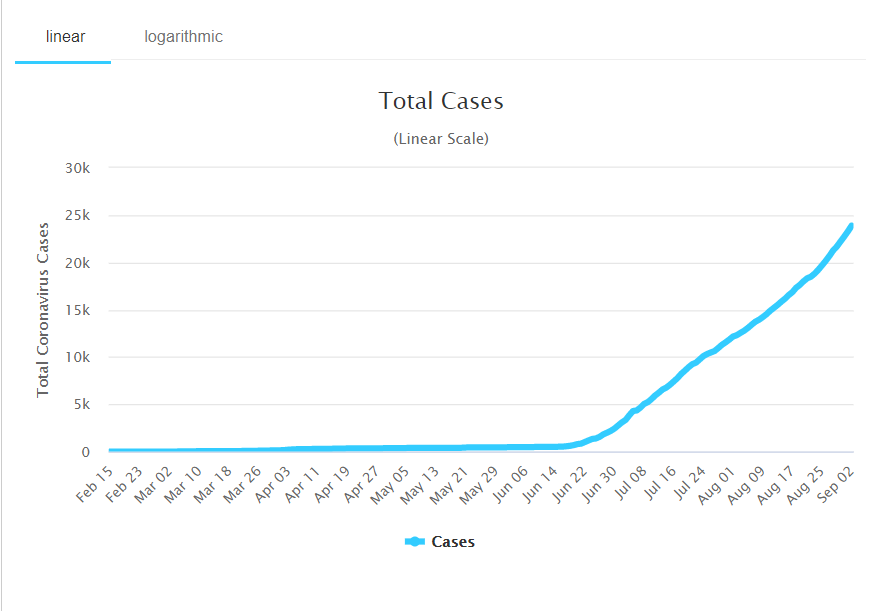

CHART SOURCE: https://www.worldometers.info/coronavirus/country/state-of-palestine/
Palestine’s Ministry of Health has already requested supplies from the United Nations (UN) and the international community at large. However, much of the UN’s funding for Palestinian aid has historically come from the United States, and that funding has dried up under the current U.S. administration. How much aid Palestinian medical workers and patients can rely on from the international community remains to be seen.
Potential Spread
As COVID-19 gets foothold in Palestine, conditions are right for it to tear through the population. Tremendous population density, crowding and insufficient ways for people to self-isolate will almost certainly contribute to the rapid spread. Many Palestinians’ immune systems are ragged from a combination of stress, poor nutrition and pre-existing medical conditions that do not receive adequate treatment. And though medical personnel will work tirelessly, the modest number of resources they have at their disposal may not be enough to slow the disease down.
How Anera Helps Improve Healthcare in Palestine
For more than 50 years, Anera has been working to improve access to healthcare in Palestine. With the help of supporters from across the globe, we have been able to help build healthy communities and make dramatic improvements in the quality and availability of medical care in Palestine.
With the help of generous supporters, we have rebuilt, upgraded and improved clinics both in the West Bank and in Gaza. We also work to combat the shortage of critical medical necessities by distributing supplies such as medicines, wheelchairs and equipment. We have distributed millions of dollars worth of these necessities to help ensure more Palestinians can get the medical care they need.
We also help develop community programs to foster health and well-being. We have created and implemented programs to teach basic hygiene skills to children and to help parents identify the symptoms of infectious disease in their kids. We support open clinic days so everyone in the community can receive care.
As COVID-19 spreads, we will continue providing crucial personal protective equipment and supporting clinics in their fight against the disease. Your support goes directly toward helping us reach more people with these initiatives. Keep up to date with our COVID-19 response here.
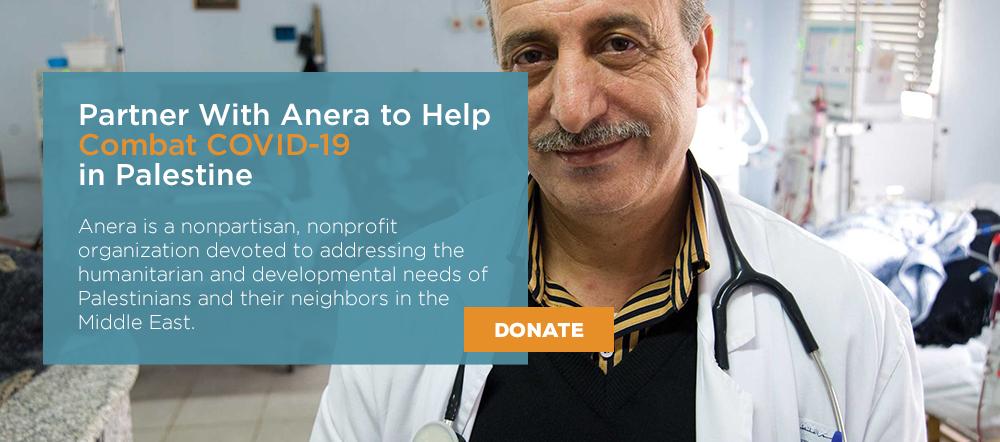

Partner With Anera to Help Combat COVID-19 in Palestine
Anera is a nonpartisan, nonprofit organization devoted to addressing the humanitarian and developmental needs of Palestinians and their neighbors in the Middle East. When you make a gift to us, you can directly support healthcare in Palestine and save lives throughout the COVID-19 outbreak.
Donate today to help provide critical medical aid for Palestinians, or contact us to learn more.
OUR BLOG
Related
The first time I visited Gaza was on my birthday, back in March 2016. I hadn’t told anyone it was my birthday – I’m not big on celebrations – but in true Gaza fashion, the team found out and insisted…
No one should be left behind when it comes to water. This year for World Water Day Anera is highlighting the situation in Gaza and poetry from Indigenous activists.
>>> Read the full report Israel launched a massive air assault across Gaza in the early morning hours of March 18. The attacks broke the fragile ceasefire agreement signed in January 2025, resulting in the death and injury of over…
